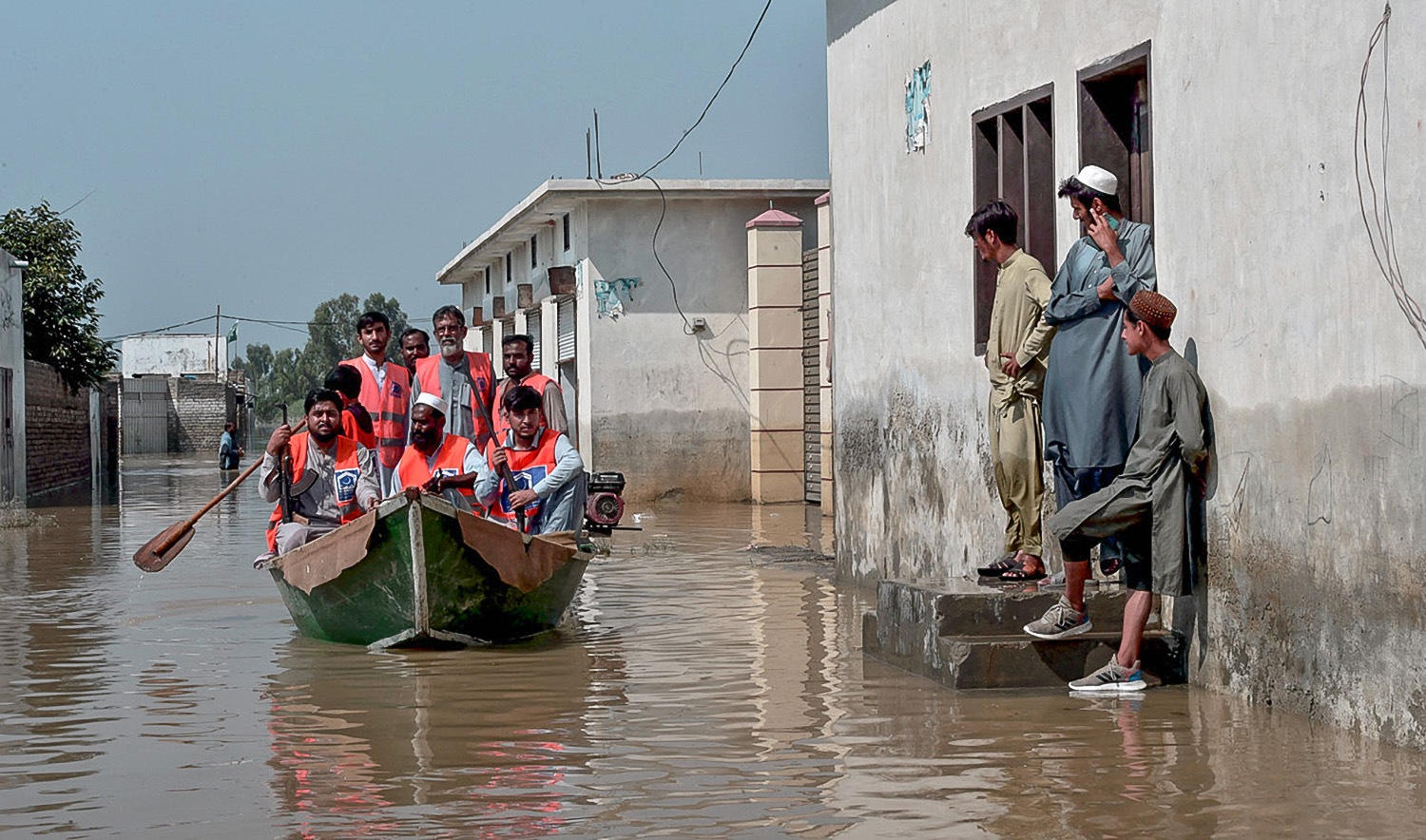KARACHI: Pakistan on Sunday reminded wealthy countries of their “crucial” responsibility in supporting climate-vulnerable nations and the need for “equity and justice” in global climate policies.
The message, which came in a statement from the planning ministry, was issued in a special handout ahead of the 2023 United Nations Climate Change Conference, more commonly referred to as COP28, being held in Dubai from November 30 to December 12.

Armed members of Alkhidmat Foundation patrol on a boat at a residential area submerged in floodwater in Nowshera of Pakistan's Khyber Pakhtunkhwa province on August 29, 2022. (AFP/File)
Last year’s summit in Egypt came on the heels of record floods in Pakistan that killed over 1,700 people and caused more than $30 million in damages to the economy. This year’s conference comes as Pakistan, while only contributing 0.9 percent to global greenhouse gas (GHG) emissions, remains one of the most vulnerable countries to the impacts of climate change.
A deal to create a “loss and damage” fund was hailed as a breakthrough for developing country negotiators, headed by Pakistan, at COP27 in Egypt last year, overcoming years of resistance from wealthy nations. But since the summit, governments have struggled to reach consensus on the details of the fund, such as who will pay and where the fund will be located.
A special UN committee tasked with implementing the fund met for a fifth time in Abu Dhabi earlier this month, following a deadlock in Egypt last month, to finalize recommendations that will be put to governments when they meet in Dubai next week. The goal is to get the fund up and running by 2024.
“As the global community converges for COP28, Pakistan’s story is one of resolve and action in the face of overwhelming odds,” the Pakistani planning ministry’s statement said.
“The fight against climate change is a global one, requiring concerted efforts from all nations. The wealthiest, contributing significantly to global emissions, have a crucial role in supporting vulnerable countries like Pakistan. The disparity in emissions and impact highlights the need for equity and justice in global climate policies.”
The ministry also laid out the country’s National Adaptation Plan (NAP) 2023, which focuses on six pillars, namely water resource management, agriculture and food security, forests and biodiversity, disaster management, infrastructure, and public health.
In water resource management, Pakistan aims to focus on the sustainable management and utilization of water resources to ensure water security in the face of changing climate conditions. It also plans to enhance the resilience of the agricultural sector to climate change impacts, ensuring food security, and promoting climate-smart agricultural practices.
“Conserving and sustainably managing forests and biodiversity to enhance ecosystem resilience and carbon sequestration capabilities” is a key pillar of NAP 2023, the ministry said, as is strengthening disaster risk reduction and preparedness mechanisms to reduce vulnerability to climate-induced disasters such as floods, heatwaves, and droughts.
Under a focus on infrastructure and built environment, NAP 2023 envisions “adapting and fortifying infrastructure, including urban and rural settlements, to be resilient against climate risks and impacts.”
Addressing the climate change impacts on public health and ensuring the resilience of health systems to cope with climate-induced health challenges is another central pillar of the plan.
“These pillars collectively aim to build a comprehensive and integrated approach toward making Pakistan more resilient and adaptive to the adverse effects of climate change,” the planning ministry added.
Among significant projects under NAP 2023 is the Balochistan Integrated Flood Recovery and Resilience Project (IFRAP), with a $213 million investment from the World Bank, which aims to rebuild flood-affected communities with a focus on long-term resilience, reconstructing infrastructure and strengthening local capacities to manage future climate risks.
In Sindh, the Coastal Resilience project tackles challenges posed by rising sea levels and coastal erosion and is “crucial for protecting the livelihoods of communities dependent on fragile coastal ecosystems.”
“From large-scale projects to community-level initiatives, the journey toward a sustainable and resilient future is a collective one,” the statement concluded.
“In this endeavor, Pakistan stands as a testament to what can be achieved with vision, commitment, and collective action in the face of climate diversity.”












